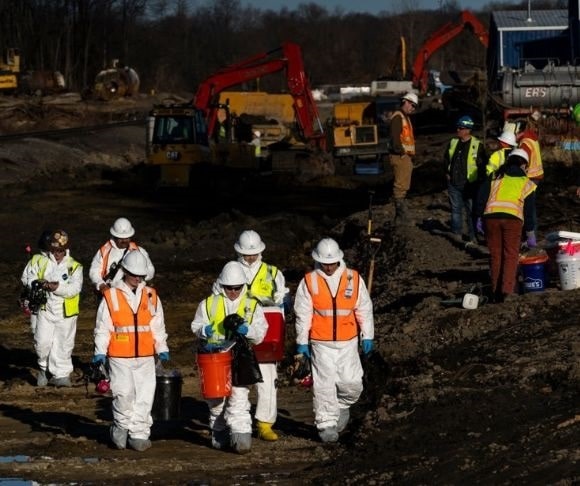An Environment and Public Works Committee hearing held Thursday, March 9, demanded answers from Norfolk Southern regarding the toxic train derailment in East Palestine, Ohio and what the company was going to do for the residents and future rail safety. The railroad’s CEO, Alan Shaw, spoke before the panel, promising everything and nothing at the same time.
Health Concerns After Toxic Train Derailment
Contamination from the toxic spill has residents and officials concerned about the area’s water, air, ground, and health hazards, not just for the immediate needs, but into future years as well. Although reports indicate that natural resources do not show higher than allowed contaminants, there is still the risk of long-term exposure to certain chemicals. Ohio Environmental Protection Agency Head, Anne Vogel, questioned:
“How long will we test the water? How long until the fish come back? Can I play in the yard and eat out of my garden? How or when will we know if the damage to our village is worse than we thought or even irreparable? These are legitimate questions, and I am committed to finding answers.”
Shaw promised his company would help, even if it took “ten years or more.” The CEO started off his testimony by apologizing for the derailment and promised Norfolk Southern would help the city with whatever it needs. “I am terribly sorry for the impact this derailment has had on the folks of that community,” he explained. “Yes, it is my commitment and Norfolk Southern’s commitment that we are going to be there for as long as it takes to help East Palestine thrive and recover.”
But what about health complications? This was something most wanted to know, and Shaw provided vague assurances but no promises. It was so bad that Senator Bernie Sanders (I-VT) accused him of talking like a politician. Here is a portion of the conversation:
Sanders: “You talked about covering the needs of the people of East Palestine – does that include paying for their health care needs – all of their health care needs?”
Shaw: “We are going to do what’s right.”
Sanders: “What’s right is to cover their health care needs. Will you do that?”
Shaw: “Everything is on the table, sir.”

Alan Shaw (Photo by Anna Moneymaker/Getty Images)
The Vermont senator changed the topic slightly to drill the railroad CEO on providing sick leave for employees. So far, Norfolk Southern has refrained from committing to several options, including paid sick days, compensating the residents of East Palestine for loss in home values, pausing stock buybacks, and supporting all the parts of a proposed bill to increase rail safety.
Sanders: “You provided paid sick days to some of your employees. Will you make that commitment right now to guarantee paid sick days to all of your workers?”
Shaw: “I share your focus on our employees. I will commit to continuing to discuss with them important quality-of-life issues.”
Sanders: “With all due respect you sound like a politician here, Mr. Shaw.”
Safety Concerns
The toxic train derailment is just one of several worrisome accidents to happen in recent months. And, ironically, as Shaw promised lawmakers during the hearing that Norfolk Southern “runs a safe railroad,” the committee heard news of another train going off the tracks in Alabama, prompting Sen. Sheldon Whitehouse (D-RI) to tell the CEO, “You may need to look into that.” Over the weekend, a freight train derailed in Springfield, and in Cleveland last week, a Norfolk Southern conductor was struck by a dump truck at a rail crossing and killed. This series of accidents have prompted a bipartisan group of senators to introduce The Railway Safety Act of 2023.
In a press release, the National Transportation Safety Board (NTSB) announced it would be conducting an investigation into the rail conglomerate:
“Given the number and significance of recent Norfolk Southern accidents … the NTSB is concerned that several organizational factors may be involved in the accidents, including safety culture. The NTSB will conduct an in-depth investigation into the safety practices and culture of the company. At the same time, the company should not wait to improve safety and the NTSB urges it to do so immediately.”
The Federal Railroad Administration also said it will conduct a 60-day safety review of Norfolk Southern. Transportation Secretary, Pete Buttigieg, said in a statement, “After a series of derailments and the death of one of its workers, we are initiating this further supplemental safety review of Norfolk Southern, while also calling on Norfolk Southern to act urgently to improve its focus on safety so the company can begin earning back the trust of the public and its employees.”

(Photo by Michael Swensen/Getty Images)
“Moving forward, we are going to rebuild our safety culture from the ground up,” Shaw said. “We are going to invest more in safety. This is not who we are, it is not acceptable, and it will not continue.”
However, the Norfolk Southern CEO’s words did not inspire much hope to those who live in the area where a toxic train derailment has damaged their community, possibly for years to come. Negley, OH, resident Kathy Reese said, “I think he’s [Shaw] full of it. It’s great that he wants to put millions into everything, but that’s not going to change how peoples’ health is. If the health is already ruined by this air and stuff, unfortunately that’s not going to help.” She complained that Shaw didn’t really offer any assurances and “keep[s] skating around questions.”
According to data from the Federal Railroad Administration, there were more than 1,000 train derailments last year. Of the roughly 30 million shipments across railroads in the US each year, 7% – 8% contain hazardous materials. But railroads can mix and match the train cars so that some shipments might contain hazardous materials on pretty much any train.




